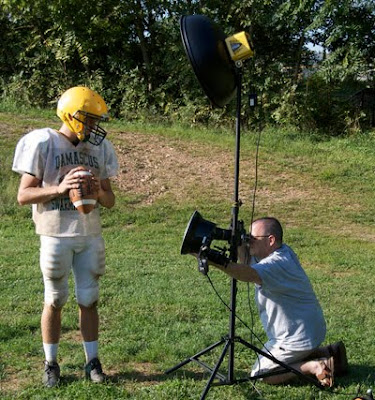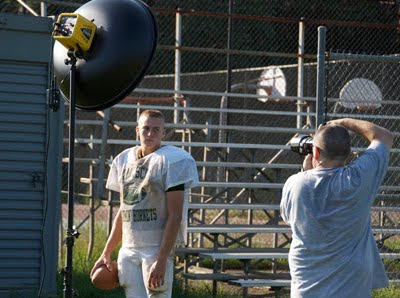My first 50 or so assignments as a stringer for the Leesburg Commercial in central Florida in the early '80's were high school football games.
We were shooting in towns like Eustis, Umatilla, Tavares and Groveland, who at that time could claim exactly one McDonald's restaurant between them.
It was small-town (but not small-time) high school football. The fields were hideously dark, the action was great and the Commercial's deadline wasn't until 9:00 the next morning.
That's because the paper was a PM daily, which meant we could print in the darkroom all night long while eating cold pizza and watching bad movies on our safelight -- a 9" b&w TV with a dark red gel over it. I was in heaven.
And as much as I liked shooting college and pro football later, I always loved shooting preps just as much if not more.
Earlier this season I shot Damascus (MD) High School standout QB Connor Frazier for Rivals.com, dragging out my then-new AlienBees to overpower the mid-afternoon sun.
__________
Tear it Down, Build it Back Up
When we got to Damascus High School they were in mid practice. So we had a little time to scout a shooting area while they wrapped up. I was with Erik and Dave, two local readers who had answered my standard tweet looking for any VALs who might be interested in helping out with a shoot.
(If you would like to assist or hang out, follow me on Twitter and keep a lookout. I have a project starting up which will take me to many cities, and a local set of eyes and hands always helps.)
The sun was ugly and to our backs, so we walked across the field to be able to turn back and shoot into it. When the sun is not your friend, shooting into it gives you control.
First step, which should be beaten into your head by now: Go to 1/250th of a second. This buys you the best possible aperture for shooting with flash. Then, we knock the ambient down -- way down -- with a closed-down aperture, chimping as we go. Stop when it looks cool.
Next, we'll build Connor back up with flash. This is something big lights allow you to do -- even if you are softening the light -- with ease. We start with what will be the fill light (an ABR800) as we will definitely need to get inside that helmet. A ring light will let us dial that internal detail up or down without casting its own shadow. That's why I like ring fill better than shadow-side fill.
Once the fill is cranked up to where we want it (leaving our pre-set exposure alone, to preserve our ambient look) we can then move on to the key light. That was courtesy an AB1600, in a beauty dish. Not too hard, not too soft. And again, we dialed up the power on this flash until Connor was lit to the proper exposure against the suppressed ambient background.
For just a smidge of added dimension, we used a VAL'd SB-800 speedlight at back camera left to throw a little edge light on the left side of the ball and the helmet. It's a little thing -- and very subtle on the exposure -- but I think it makes everything look more crisp and 3-D.
One other thing -- we overclocked the sync a little bit (1/320th, maybe?) to get that unsync'd zone across the bottom. Gave us a little more control over the sun and kept that white jersey from walking your eye right out of the bottom of the photo.
Here is a setup shot, which shows just how contrasty and crappy our straight ambient light was at the time:
 That pic (courtesy Dave Kile) does not include the VAL'd SB-800 -- it would be coming from just out of the frame at left.
That pic (courtesy Dave Kile) does not include the VAL'd SB-800 -- it would be coming from just out of the frame at left.One thing you can see here is that I have detached the ring light from the camera so I can feather it up quite a bit. This allows me to keep the bottom of the frame, which is much closer to the ring light, from getting too hot. Actually I feathered it a lot higher than in this photo. But you can see the disconnect from the lens axis and the light axis, which is what is important.
Portrait and a Headshot
The job called for a single portrait with a little space in it. But I always include a tight headshot, for several reasons.
Number one, headshots get re-used -- a lot. That was something I learned freelancing back in college when every penny counted: Always make a habit of including an extra headshot. Do it often enough and you will be rewarded by little surprise re-use checks for years to come. They are never big, but then, it's found money.
Plus, a headshot, lit well, can also morph into a cover if need be. And those checks are bigger.
The sun was getting a little lower so that gave us some options. We scrounged a shipping container (naturally, on a football field, right?) as a shade/sun background and went to work there.
I say shade/sun because the container was in shade but the area in front of it was getting sun rim light. That's gonna make this headshot easy-peasy-lemon-squeezy, as the gecko says.
The whole thing is built on that ambient rim light. We put it over his camera-left shoulder and dropped down the ambient exposure until the color was rich and the rim lit area was just losing detail.
Here's the setup:
 In the past, I generally would have the key light and the rim light coming from opposite directions. But lately I prefer to key and rim from the same side if I have detail and separation on the shadow side. Just makes for a cooler looking wrap, I think.
In the past, I generally would have the key light and the rim light coming from opposite directions. But lately I prefer to key and rim from the same side if I have detail and separation on the shadow side. Just makes for a cooler looking wrap, I think.So we brought the beauty dish in from upper camera front left and cranked it up until his face looked good. Notice -- no flash meter. Again, it's just an add-salt-to-taste progression that goes very quickly and leaves you the natural option of doing something other than the "perfect" flash exposure.
I used to obsess about perfect. Metered to a tenth of an f/stop. (Screw The Force, Luke. Trust your Meter.)
Now, I could give a rat's butt about "perfect," preferring to go with what I think, looks best. It's the relationship between the different light levels that matters, anyway. And if you always go for perfect exposure values (as conferred upon you by your Almighty Flash Meter) your photos start to look a lot alike.
That's another reason to embrace a little randomness, IMO. Make mine al dente, please.
(We did a looser version, too, but I prefer the headshot.)
Is it a "perfect" exposure as defined by a flashmeter? No clue.
But I like it, and I am a Committee of One where exposure is concerned. (It passed, unanimously.)
Football Football Football Football Football
Now that I am no longer spending my fall Saturdays away from the family shooting college football for the paper, I have had the chance to go from being a mere Florida Gator fan (my alma mater) to being a crazy, raging, full-on brainwash-your-kids Florida Gator fan.
But long before I went to the University of Florida, I was an University of Alabama fan. Way back in the days of Major Ogilvie, I wore Crimson and yelled "Roll, Tide!" from first snap to final whistle. And during the years I shot for the paper at UF, road trips to 'Bama were my favorite away games to shoot. Great teams, great fans and great parties afterward.
On Saturday, my two favorite teams, both undefeated and now ranked #1 and #2, will play each other in the SEC championship game. The winner will go on to play for the national championship in January.
I will admit to being a little conflicted. But not much.
On Sunday I will go back to being a fan of both teams. But until then, Go Gators. Beat Alabama.
__________
Next: Shooting for Social Media
No comments:
Post a Comment